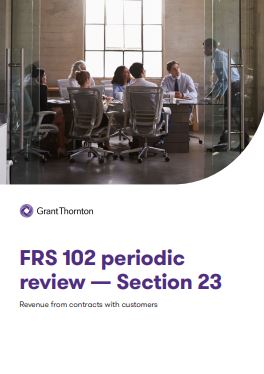
The Financial Reporting Council (FRC) has completed its second periodic review of FRS 102, introducing significant changes to how entities in the UK and Ireland recognise revenue from contracts with customers. These updates, effective for periods beginning on or after 1 January 2026 (with early adoption permitted), will have practical implications for a wide range of businesses.
Why this matters
The revised Section 23 of FRS 102 replaces the previous risks-and-rewards model with a comprehensive five-step approach to revenue recognition. This shift brings FRS 102 closer to international standards (IFRS 15), aiming to improve consistency and transparency in financial reporting. The changes are particularly relevant for accounts preparers, finance teams, and industry professionals who manage complex contracts or multiple deliverables.
Key changes at a glance
- New five-step revenue model:
- Identify the contract(s) with a customer
- Identify the performance obligations
- Determine the transaction price
- Allocate the price to performance obligations
- Recognise revenue as obligations are satisfied
- Focus on performance obligations: Revenue is now recognised as and when performance obligations are met, not simply when risks and rewards transfer.
- Wider impact: All entities entering contracts with customers are affected, including micro entities under FRS 105.
- More detailed disclosures: The revised standard requires enhanced disclosures about revenue streams, contract balances, and performance obligations.
Practical implications for businesses
Some sectors will see more significant changes than others, for example:
- Supply chain and telecoms: Businesses with bundled products (e.g., “free” handsets) must allocate revenue based on relative standalone selling prices, not marketing cost.
- Professional services and asset management: Performance-based and contingent fee arrangements must estimate variable payments, subject to constraints.
- Retail: Accounting for returns, loyalty schemes, and warranties will change, with new requirements for recognising refund liabilities and assets.
Other areas affected include deferred payments, licensing, non-refundable fees, and customer options for additional goods or services.
Transition options
Entities can choose between:
- Modified retrospective approach: No restatement of prior year figures; adjustments are made to opening reserves in the year of adoption.
- Full retrospective approach: Restate prior year figures as if the new rules had always applied.
Both methods require specific disclosures to explain the impact of the transition.
Enhanced disclosure requirements
The revised Section 23 mandates more extensive disclosures, including:
- Disaggregation of revenue by type, geography, or timing;
- Details of contract balances and movements;
- Information on performance obligations and payment terms;
- Methods used for recognising revenue over time;
- Explanations of significant unsatisfied obligations.
Sign up for expert insights, industry trends, and key updates—delivered straight to you.
What should you do next?
- Review contracts: Assess how the new model affects your revenue recognition policies, especially for complex or bundled arrangements.
- Prepare for new disclosures: Ensure systems can capture the required data for enhanced reporting.
- Plan your transition: Decide which transition approach best suits your business and prepare for the necessary disclosures.
Grant Thornton’s technical experts are closely monitoring these changes and can help you navigate the transition with confidence.
For the full technical guidance, download the complete report [ 11702 kb ].


